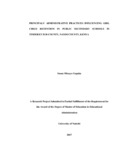| dc.contributor.author | Unguku, Susan M | |
| dc.date.accessioned | 2018-02-01T06:03:04Z | |
| dc.date.available | 2018-02-01T06:03:04Z | |
| dc.date.issued | 2017 | |
| dc.identifier.uri | http://hdl.handle.net/11295/103067 | |
| dc.description.abstract | The purpose of this study was to investigate principals’ administrative practices influencing girl child retention in public secondary schools in Tinderet sub-County, Nandi County, Kenya. The objectives of the study were to establish the influence of principals’ provision of guidance and counselling resources, implementation of re-entry policy for girls after delivery, reduction of extra levies and management of access points on girl-child retention .This study adopted the system approach theory which was developed by Ludwing Von Bertalanffy as cited by pandya (2011). The study employed a descriptive survey research design. The target population comprised of 29 public secondary schools, 201 class teachers, form four girls and 29 principals. Stratified random sampling was used to identify the sample schools to ensure that all the school categories both boarding and mixed secondary schools were included. Simple random sampling was used to select 186 students out of 1860 and 60 teachers out of 201. The 9 principals were purposively selected from 29 schools because they were believed to have rich information in the study. The study administered questionnaires to class teachers and students for data collection. Data from the principals’ were gathered using interviews. Statistical package for social science (SPSS) 22.0 version computer programme was used to analyze the data Quantitative data was analyzed using descriptive statistics and presented in frequencies, percentages, charts, graphs and pie charts. Qualitative data was analyzed in themes and sub-themes which emerged from the data. The findings of the study established that majority of respondent (76.7%) teachers and (73.8%) students in schools where the principals provided adequate guidance and counselling resources had high retention rate. Availability of these resources created an enabling environment for girls and this kept them in school for the entire education cycle, majority of teachers (79.1%) and students (68%) revealed that many principals had implemented re-entry policy and encouraged pregnant girls to go back to school after delivery encountered high retention. On implementation of reduction of extra levies, indicated that (69%) of the schools with low levies promoted high retention rate (83.5%). This showed that principals had scaled down the development of income generating projects to reduce extra levies. Majority of respondents (62.8%) teachers and (68%) students agreed that many principals’ had implemented management of access points and majority of schools had one access point which helped principals in monitoring the movement of students in and out of the school thereby registering high retention rate The study recommended that principals need to ensure guidance and counselling resources are available, the community need to be sensitized about re-entry policy, schools should come up with income generating projects and schools need to have limited access points with perimeter wall to avoid sneaking of girls to enhance high girl-child retention rate. | en_US |
| dc.language.iso | en | en_US |
| dc.publisher | University of Nairobi | en_US |
| dc.rights | Attribution-NonCommercial-NoDerivs 3.0 United States | * |
| dc.rights.uri | http://creativecommons.org/licenses/by-nc-nd/3.0/us/ | * |
| dc.subject | Principals’ Administrative Practices Influencing Girl Child Retention in Public Secondary Schools in Tinderet Sub-county, Nandi County, Kenya | en_US |
| dc.title | Principals’ Administrative Practices Influencing Girl Child Retention in Public Secondary Schools in Tinderet Sub-county, Nandi County, Kenya | en_US |
| dc.type | Thesis | en_US |



